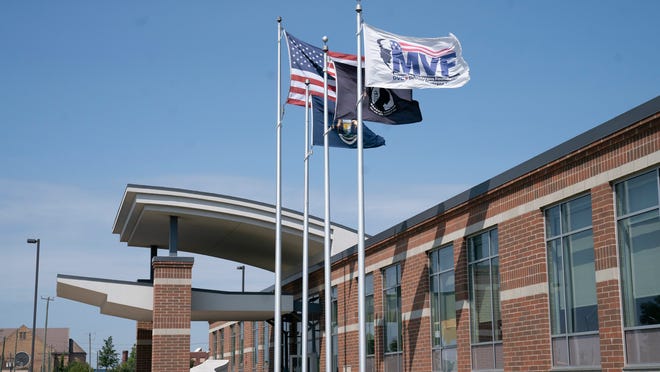

On Monday, a large portion of the nation’s workforce will receive a well-deserved day off in observance of the Labor Day holiday.
However, for Raeda Dabaja, Monday will be a normal work day in Detroit and she would not have it any other way because the daily labor performed by Dabaja and her team — 12 months a year — helps to make life better for heroes that made the ultimate sacrifice through service to their country.
“I never look at what I do as work because I enjoy what I’m doing,” said Dabaja, the CEO and executive director of the nonprofit Michigan Veterans Foundation (MVF), which operates the only shelter for veterans in Detroit at MVF’s Detroit Veteran Center inside a building affectionately called “The Pentagon,” 4626 Grand River, in the Woodbridge neighborhood. “I like to say that every day is an adventure.”
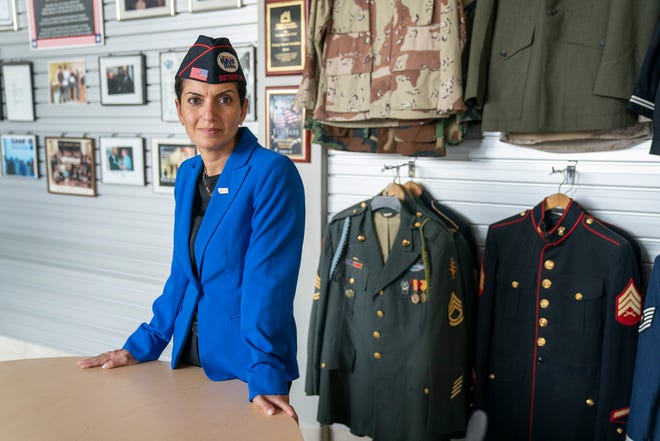
A native of the Democratic Republic of the Congo, Dabaja came to the United States in 1997 and after becoming a wife and mother, she had aspirations of a nursing career while attending the University of Detroit Mercy. After transferring to Davenport University, Dabaja turned her focus to the human service arena and planned to become a case manager. But the real career “adventure” for Dabaja would begin in 2009, when while pursuing an internship she was given a tour of the Michigan Veterans Foundation’s previous modest headquarters at 2770 Park Ave., which put her in touch with something that Dabaja thought she would never see in America.
“I never expected a veteran to be homeless,” the now 44-year-old Dabaja said on Wednesday from her office on Grand River. “Right there during the tour, it came to me that there was another way I could give care other than being a nurse and it was through MVF.”
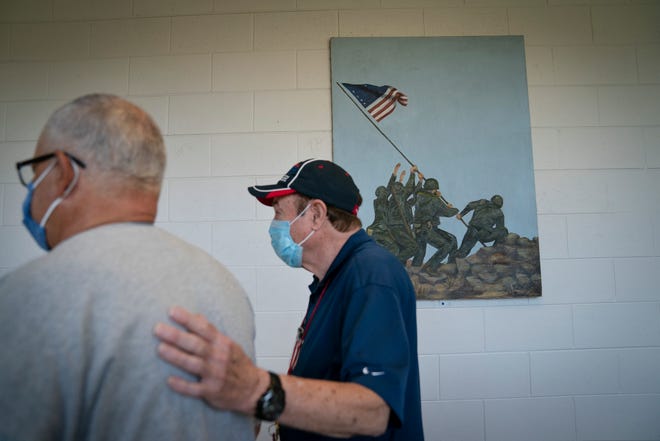
Dabaja’s tour guide on that life-changing day was the late Tyrone Chatman (Sept. 26, 1952 – Feb. 26, 2020), a decorated Vietnam veteran who joined the Army when he was 17. Chatman, who was awarded several medals for his distinguished service, including the Combat Infantryman Badge, National Defense Service Medal, the Vietnam Service Medal and the Vietnam Campaign Medal, established MVF in 1989 with help from others in the community who shared his unquenchable desire to support veterans in need.
Chatman also would become Dabaja’s mentor. And after a frenetic period that included parts of 2009 into 2010, during which Dabaja completed 120 internship hours at MVF; worked weekends at Harper Hospital; finished her remaining course work to earn a bachelor’s degree in case management; while also supporting her son and daughter’s after-school activities, Dabaja joined MVF as an executive assistant. Her need to do more for veterans and the organization led Dabaja to assume additional roles and take on greater responsibilities at MVF through the years. Ultimately, Dabaja was tapped to lead the nonprofit after Chatman’s death from organ failure, which occurred shortly before COVID-19 began to appear in Michigan.
In addition to providing 50 beds for veterans through its transitional housing facility — where veterans may stay from 90 days to 18 months, depending on the veteran’s circumstances — MVF provides veterans three square meals daily, clothing, health care services, employment training, a life-skills curriculum that was developed with direct input from homeless veterans, and many other forms of support designed to transform homeless veterans into independent wage earners and tax payers with permanent homes.
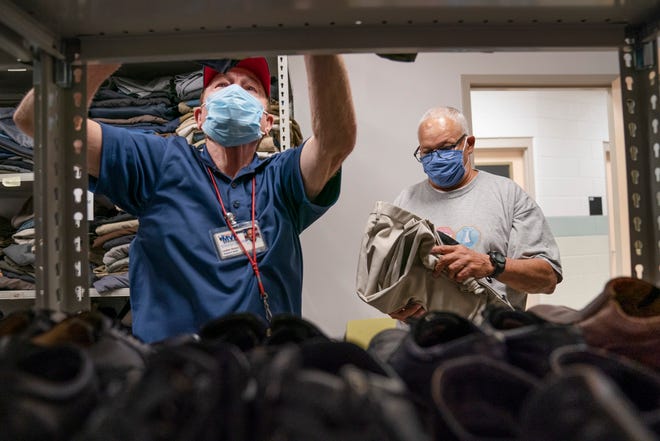
Since May 12, Dabaja says, MVF, which heavily depends on government grants, has had to do more with much less after the federal COVID-19 Public Health Emergency declaration was lifted on May 11. In the last paragraph of a thank you letter that Dabaja has been distributing to supporters, it says that “the foundation is at high risk of shutting down due to a 50% funding cut” that began May 12, 2023. On Wednesday, Dabaja expressed her deep gratitude for the people and organizations that have supported MVF from the heart, while also saluting the continued dedication of her staff during a challenging period for the nonprofit.
“It takes a village to provide support for our veterans,” said Dabaja, who on Monday’s holiday will be joined by a smaller but highly capable group of staff members at the Detroit Veterans Center, which will include Corey Buckley, a case manager; Lorenzo Richardson, a cook; and Rico Kimpson, security. “Everything we do is a team effort and everyone on staff does everything they can for the veterans, regardless of the staff member’s job title. Anything the veteran needs, and anything a veteran may need to secure housing, our staff is here to help.”
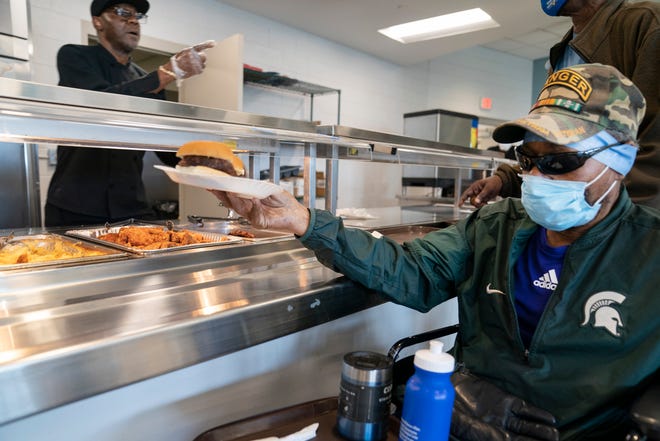
MVF’s team approach appeals to the nonprofit’s resource development director, Ray Williamson, given that he was an All-City, two-way performer on a Detroit Southeastern football team that played in the 1964 “Goodfellows Game” against St. Ambrose coached by the late George Perles at Tiger Stadium. On Wednesday, in his office at MVF, Williamson, 76, recalled that experience with pride and joy as he talked about the emotions he felt when he was assigned the same locker that was used by Yale Lary, who starred for the Detroit Lions during the 1950s and 60s as a safety, punter and return specialist. Williamson’s 1964 Southeastern football team had a perfect record before losing to St. Ambrose in blizzard-like conditions on Nov. 20, 1964.
More:A calling to be a ‘hub’ for northwest Detroit community moves Christ the King
However, there was nothing close to perfect about another scene Williamson described on Tuesday, which took him back to his return to Detroit during the 1970s following his Marine Corps service in Vietnam. Thinking he had no other place to go, Williamson found shelter in an abandoned home on Continental Street near Mt. Elliott. In this instance, location was everything because at some point during what Williamson believes was 1975, while working at a car wash that still stands today on Jefferson Ave. just west of Mt. Elliott, he was approached by another veteran who paid more attention to the tan shirt with green stripes that Williamson was wearing instead of the condition he was in at the time.
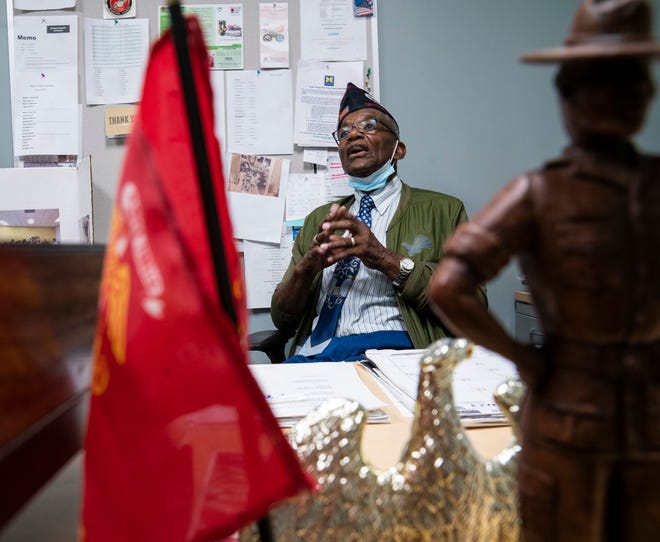
“That veteran didn’t know me from Adam, but not only did he speak to me and ask why I was doing the kind of work I was doing as a veteran, he parked his car and wrote down telephone numbers of places where I could get help,” said Williamson, who described the encounter as the event that “got the ball rolling” for him in a positive direction, which later led to him enrolling at Wayne County Community College at the age of 46 en route to earning a bachelor’s degree in social work from Madonna University.
Williamson confided that during some of his darkest days upon his return from Vietnam, he had difficulty letting go of a gun and alcohol. But today, he faces the challenge of keeping enough business cards on hand, as he estimates that he has given out thousands of cards to veterans at MVF and throughout the community while attempting to help and inspire veterans that can benefit from his support.
“I can never give back as much as I have received,” said Williamson, who is the proud husband of 38 years to Sheryl Calloway Williamson and equally proud father to four adult children. “I know from personal experiences that the Michigan Veterans Foundation is a win-win scenario for veterans who are homeless. When I was homeless, there were no facilities like this. So, I model a lot of what I do based on what Mr. Chatman did. Mr. Chatman was always involved, always looking ahead, always thinking about helping people. And today, this place is a testament to who he was and still is.”
More:99-year-old WWII veteran was on Normandy beaches during D-Day, now lives in Farmington
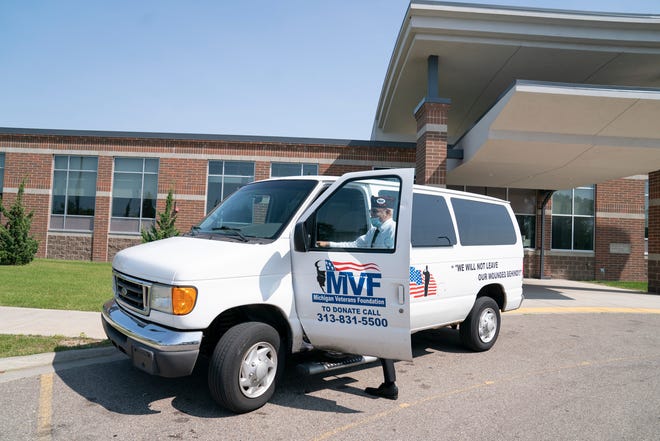
On Tuesday, as lunchtime approached, Williamson shared stories about Chatman and a host of MVF successes with Robert Castillo, a 1972 graduate of Detroit East Catholic High School and a 32-year Air Force veteran, who now serves as MVF’s resource development deputy. The mutual respect shared by the two men was immediately evident, as words like “integrity” and “sincerity” were shared by both as they described their feelings for each other and people and community partners they have both worked with, such as Neighborhood Service Organization (NSO), where Williamson worked closely with Chatman before MVF was launched. A day earlier, in a much more soft-spoken manner, Dabaja also enthusiastically cited successes and explained how MVF has available resources that can help even more veterans in the future, including a computer lab donated by SAY Detroit, which was founded by Detroit Free Press columnist Mitch Albom. Through their words, Williamson, Castillo and Dabaja revealed that there is no shortage of success stories connected to MVF. But they also made it clear that there is no “magic” involved in their work, either. Dabaja explained that it may take a homeless veteran several attempts to successfully return to society. But she also said that she has been blessed with team members that take their own personal oaths to serve veterans very seriously and are prepared to go the distance for any veteran in need.
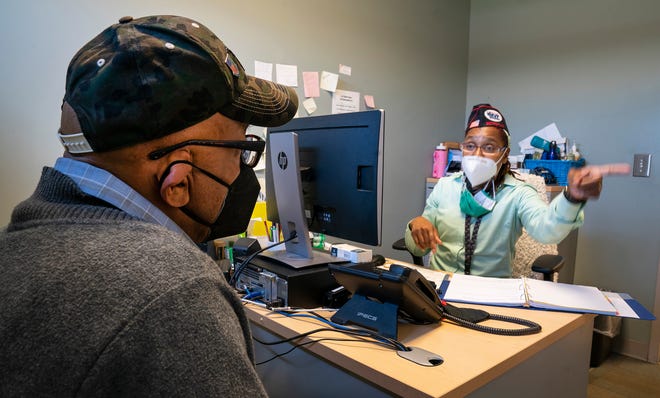
Another example of the type of dedicated team members that Dabaja has been blessed to work with is case manager Samantha Winston, a 1984 graduate of Redford High School, where she had four years of ROTC. Winston says MVF rescued her 14 years ago from a previous career in retail, where she did not experience fulfillment. And on Tuesday, she joked about driving more miles around the Detroit area while transporting veterans to resources they need — such as the Social Security Office, Veteran Affairs buildings and apartments — than even her husband, Eric Winston, who makes a regular commute to Battle Creek as a professor at Kellogg Community College. But mixed in with her steady laughter and smile were plain-spoken words that described a woman who is totally in her element each time she serves veterans.
“I have 18 clients, but that really doesn’t mean anything because I see them all,” Winston said. “If a veteran needs help, I’m here. I try to do everything I can. And it’s the same thing with Ms. Dabaja. If she needs anything, I’m Johnny on the spot. We’re all going to do what we have to do to keep these doors open for the veterans.”
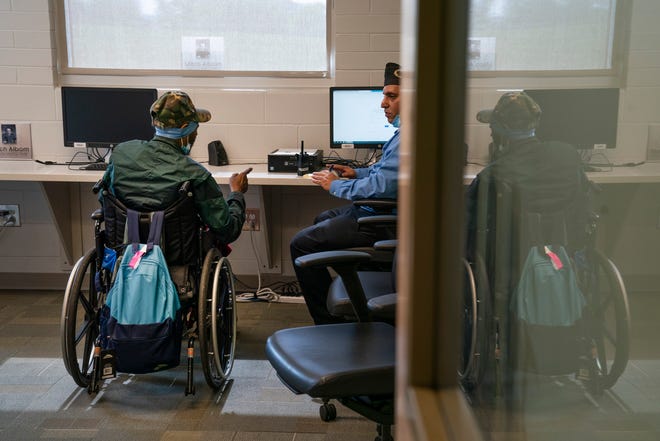
Scott Talley is a native Detroiter, a proud product of Detroit Public Schools and lifelong lover of Detroit culture in all of its diverse forms. In his second tour with the Free Press, which he grew up reading as a child, he is excited and humbled to cover the city’s neighborhoods and the many interesting people who define its various communities. Contact him at: [email protected] or follow him on Twitter @STalleyfreep. Read more of Scott’s stories at www.freep.com/mosaic/detroit-is/. Please help us grow great community-focused journalism by becoming a subscriber
Committed to serving homeless veterans in Detroit
What: Michigan Veterans Foundation (MVF)
Mission: To help homeless veterans regain their stability and return to self-sufficiency
Services: The nonprofit MVF operates the only shelter for veterans in Detroit at MVF’s Detroit Veteran Center located at 4626 Grand River. The full scope of services provided by MVF includes transitional housing; veteran rescue program; life skills and employment training; health care services; PTSD counseling; transportation/meals/clothing; substance abuse intervention; legal assistance; and, housing placement.
Learn more: For more information, including instructions on how to make a donation please visit MVF online at michiganveteransfoundation.org or call 313-831-5500. MVF is headquartered at 4626 Grand River, Detroit, MI 48208.






